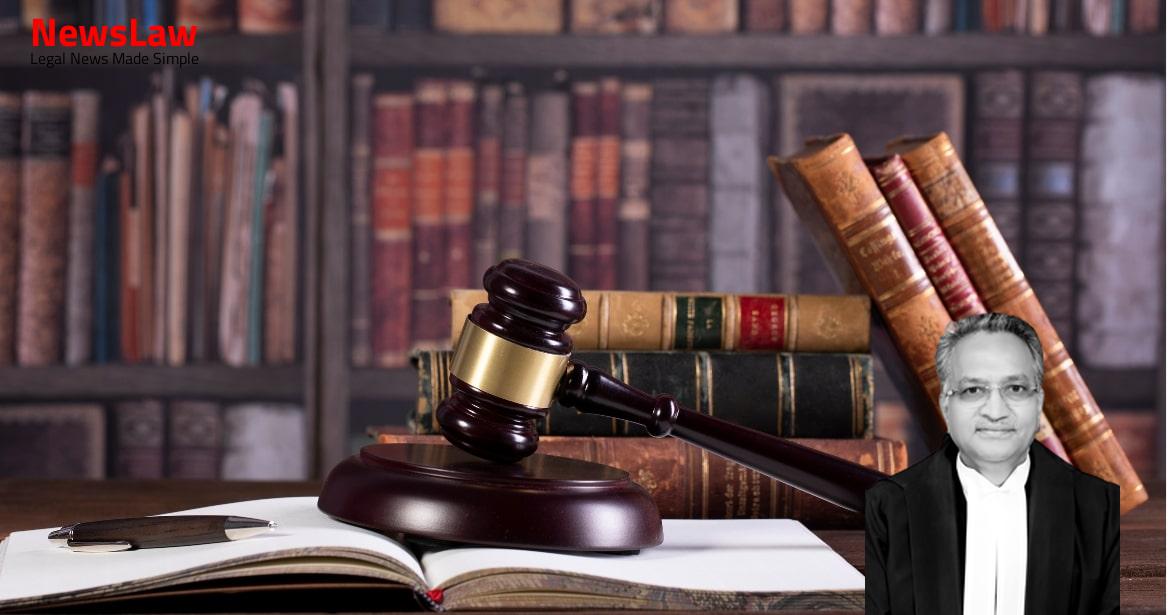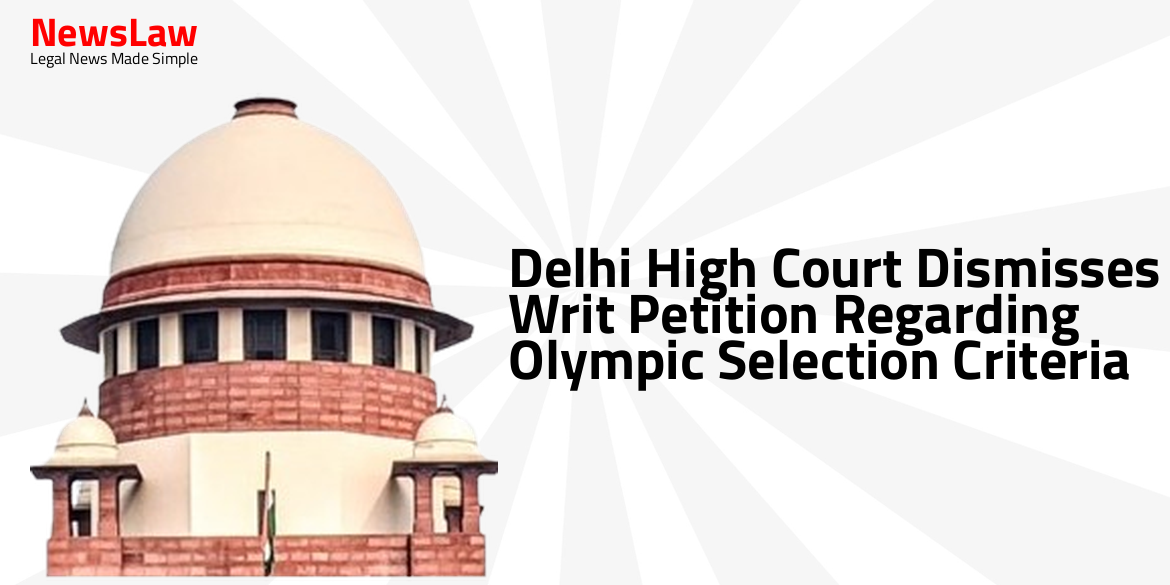This case delves into the High Court’s analysis of the revival of State enactments through the lens of legislative powers. The court’s scrutiny of the State legislature’s actions in reviving void laws and the subsequent validation through a retrospective Act raises crucial questions on the separation of powers, repugnancy between State and Central laws, and the validity of legislative amendments. The discussion underscores the complexities of legal processes surrounding the revival and validation of State enactments, highlighting the adherence to constitutional principles in a nuanced legal landscape.
Facts
- High Court held that State enactments can only be revived through re-enactment by the Legislative Assembly followed by fresh assent of the President in accordance with Article 254 of the Constitution.
- High Court quashed all pending acquisition proceedings under the three enactments on and after 27.09.2013.
- State Government attempted to revive the void enactments by tabling a Bill in the Legislative Assembly and passing it as ‘The Tamil Nadu Land Acquisition Laws (Revival of Operation, Amendment and Validation) Act, 2019’.
- President granted assent to the Act on 02.12.2019.
- High Court rejected the challenge on violation of Article 14 and non-application of mind by the President while granting assent, but found the enactments repugnant to the 2013 Act from 27.09.2013 onwards, making them void.
- Subsequent enactment of the 2014 Act from 01.2014 did not reactivate the three enactments.
Also Read: Legal Analysis on Diplomatic Immunity Exception Case
Issue
- The main issue for consideration is whether the State legislature exceeded its legislative powers by enacting the 2019 Act in a way that nullifies the High Court’s judgment.
- The key question is whether the 2019 Act validly revives State Acts declared null and void by the High Court for being repugnant to the 2013 Act.
- It needs to be determined if the State legislature overruled the High Court’s decision by enacting the 2019 Act.
- The primary concern is whether the Impugned State Enactments were rendered repugnant by the introduction of the New Land Acquisition Act by Parliament.
Also Read: Land Ownership Dispute Legal Analysis
Arguments
- Petitioners argue that the legislative tool adopted by the State legislature to revive unconstitutional enactments is an attempt to nullify the High Court’s judgment, violating the doctrine of separation of powers.
- They contend that the State enactments do not provide adequate compensation and fail to set fixed timelines for acquisition, impacting the rights of individuals.
- Petitioners emphasize that the State should have obtained the President’s assent to deviate from Parliament’s law.
- They assert that retrospectivity in the 2019 Act is fatal to its validity, as it was made on a date prior to the Presidential assent.
- Petitioners argue against amending an unconstitutional enactment post its declaration and suggest re-enacting the legislation after rectifying the identified anomalies.
- They criticize the 2019 Act for discriminating against individuals in the State by subjecting them to a different land acquisition procedure without key provisions.
- Petitioners highlight that the State must justify any deviation from Parliament’s law by demonstrating special circumstances.
- They argue that the 2019 Act lacks material provisions like social impact assessment and fair procedure, remaining repugnant to the 2013 Act.
- Respondents counter by stating the State legislature’s plenary power to amend laws and enact new ones retrospectively, focusing on State interests.
- They criticize the High Court’s judgment for not properly determining repugnancy between provisions and suggest that not the entire legislation needs re-enactment to rectify the repugnancy.
- Respondents argue that the 2019 Act effectively re-enacts the State Acts and introduces key features of the 2013 Act.
- They stress that after a declaration of repugnancy, an Act can be amended rather than wiped off the statute book.
- The reliance has been placed on the decision of this Court in The State of Madhya Pradesh vs G.C. Mandawar.
- Shri P. Wilson and Shri Suhrith Parthasarthy appeared for the petitioners, while Shri K.K. Venugopal and Shri Aman Sinha represented the respondents.
Also Read: Legal Analysis: Forfeiture of Properties under the 1976 Act
Analysis
- A validating law can be made retrospective if reasonable and not excessive.
- The legislature has the power to render a court decision ineffective by altering the legal basis on which the decision was made.
- The assent for a validating law must consider the nature and extent of repugnancy between State and Central laws.
- Legislature can change the character of a tax from impermissible to permissible through a validating law.
- Reference of provisions of an earlier statute into a later one makes the earlier provisions part of the later law for all practical purposes.
- Legislature can enact a retrospective validating law by removing the basis of a judicial decision.
- Retrospective validating statutes are permissible if they remove the defects found in the invalidated law by courts.
- The Court cannot review the validity of assent granted by the President for a validating law.
- Judicially recognized limitations exist on the legislature’s power to enact retrospective laws.
- The legislature cannot directly overrule a judicial decision but can make it ineffective by changing the legal basis.
- Legislature has the competence to enact validating laws retrospectively if it possesses the power over the subject matter.
- The High Court decision becomes irrelevant if a validating law is enacted that removes the defects found in the existing law.
- The legislature enacted the 2019 Act to amend and revive the three State enactments which were declared repugnant by the High Court.
- The State legislature sought to align the compensation, rehabilitation, resettlement, and infrastructure facilities in the State enactments with the 2013 Act.
- The High Court’s judgment noted the repugnancy between the State Acts and the law made by the Parliament, requiring a revival through Presidential assent as per Article 254(2).
- The 2019 Act retroactively validated past acquisitions under the State enactments to address the High Court’s concerns of repugnancy and voidness.
- The 2019 Act was structured to comply with Article 254(2) and the constitutional bounds for retrospective legislation.
- Contrary to the High Court’s findings, the 2019 Act was found to revive the State enactments following the correct procedural and legislative process.
- The retrospective applicability of the 2019 Act from 26.09.2013 aimed to provide legal validity to past acquisitions affected by the High Court’s decision.
- The High Court’s insistence on re-enactment was addressed by the State legislature’s reviving mechanism through the 2019 Act.
- Overall, the analysis highlights the adherence to constitutional principles in reviving and validating the State enactments in the face of repugnancy.
- The Act titled Tamil Nadu Land Acquisition Laws (Revival of Operation, Amendment and Validation) Act, 2019 came into force on the 26th day of September 2013.
- The Tamil Nadu Acquisition of Land for Harijan Welfare Schemes Act, 1978, and the Tamil Nadu Acquisition of Land for Industrial Purposes Act, 1997 were revived with effect from 26th September 2013 except for provisions on determination of compensation.
- The provisions of the Right to Fair Compensation and Transparency in Land Acquisition, Rehabilitation and Resettlement Act, 2013 apply to land acquisition proceedings under the revived Acts.
- The Act omitted certain sections of the 1978 Act, 1999 Act, and 2002 Act.
- The Act declared that actions taken under the revived Acts, except those related to determination of compensation, during the period from 26th September 2013 to the date of publication of the Act are deemed valid.
- The provisions of the 2019 Act were notified in the Tamil Nadu Government Gazette and received the assent of the President on 2nd December 2019.
- The judgement highlighted the concept of repugnancy between laws made by Parliament and State legislatures as per Article 254 of the Constitution, emphasizing the need for fresh presidential assent in case of revival of void State laws due to repugnancy.
- The Act also addressed the legislative competency of States in making laws vis-a-vis Parliament.
- The requirement of compliance with Section 105A(2) and (3) of the Act was discussed, stating that non-compliance may affect the validity of the enactments.
- The 2019 Act is found to be a legitimate legislative exercise and consistent with Article 254 of the Constitution of India and the High Court judgment.
- The petitioners are allowed to raise any other issues not covered in the judgment in pending cases related to the High Court decision.
- The writ petitions are dismissed, and the 2019 Act is upheld.
- Any further discussion on this matter is avoided in this judgment to prevent further conflicts.
- The petitioners attempted a comparative analysis between State enactments and the 2013 Act to allege a violation of equality under Article 14.
Decision
- The High Court recorded certain conclusions after discussing the case
- No order was passed as to costs
- Interlocutory applications were disposed of
- Acquisition proceedings are ongoing in the remaining 22,431 hectares of land
Case Title: G. MOHAN RAO Vs. THE STATE OF TAMIL NADU (2021 INSC 311)
Case Number: W.P.(C) No.-001411 / 2020



